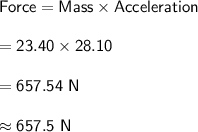
Physics, 23.07.2020 18:01, rupanti19p4sqpj
An object has a mass of 23.40 kg. If its acceleration is 28.10 m/s? what is the amount of force causing the acceleration?
A. 657.5 N
B. 0.8327 N
C. 51.50 N
D. 1.201 N

Answers: 1
Other questions on the subject: Physics

Physics, 21.06.2019 23:40, lekylawhite16
What is meant by the statement" the melting poin of glycerine is 13 degree celsius
Answers: 3

Physics, 22.06.2019 06:30, 1234fatimasm
What are similarities and differences between refraction, reflection, diffraction and absorption?
Answers: 3

Physics, 22.06.2019 15:40, winterblanco
Question 1 what is amperage? is the rate of doing work. is the rate of flow of protons in electric current. represents the amount of pressure behind electron flow. is the rate of flow of electrons in electric current. 2 points question 2 what is voltage? is the rate of doing power. represents the amount of pressure behind electron flow. is the rate of doing work. is the rate of flow of electrons in electric current. 2 points question 3 what is power? is the rate of flow of protons in electric current. is the rate of flow of electrons in electric current. is the rate of doing work. represents the amount of pressure behind electron flow. 2 points question 4 if we multiply volts times amps we get what? power circuit work current 2 points question 5 what are two ways alternating currents are similiar? in both ac and dc electrons flow in the same pattern. in both ac and dc, the flow of electrons changes directions back and forth. both ac and dc are only possible in certain materials with atoms that will allow electron flow. both ac and dc involve the flow of electrons. 4 points question 6 how does the flow of electrons flow in an alternating current? the flow of electrons is always slower in an alternating current than within a direct current. the flow of electrons is not constant and forward; it changes direction back and forth. electrons flow from from a higher affinity to that of a lower affinity. electron flow is constant and only in a forward direction. 2 points question 7 what is the flow like in a direct current? the flow of electrons is not constant and forward; it changes direction back and forth. the flow of electrons is constant and only in a forward direction. the flow of electrons go from a higher affinity to a lower affinity. the flow of electrons are always faster in a direct current. 2 points question 8 how is an electric current able to flow? electrons flow from the higher affinity to lower affinity and electrical current is generated. protons flow from the higher affinity to lower affinity and electrical current is generated. the movement of protons from one atom to another leads to an electric charge. the movement of electrons from one atom to another atom in a line results in a flow of electric current. 2 points question 9 how do electrons move from the two different types of metal in a battery? protons flow from the metal with the lower affinity to the metal with higher affinity and electrical current is generated. electrons flow from the metal with the lower affinity to the metal with higher affinity and electrical current is generated. electrons flow from the metal with the higher affinity to the metal with lower affinity and electrical current is generated. protons flow from the metal with the higher affinity to the metal with lower affinity and electrical current is generated.
Answers: 2

Physics, 22.06.2019 23:00, aliyyahlove
Awelder using a tank of volume 7.50×10^-2 m^3 fills it with oxygen (with a molar mass of 32.0 g/mol ) at a gauge pressure of 3.30×10^5 pa and temperature of 37.1 ∘c. the tank has a small leak, and in time some of the oxygen leaks out. on a day when the temperature is 23.1 ∘c, the gauge pressure of the oxygen in the tank is 2.00×10^5 pa . a) find the initial mass of oxygen. b) find the mass of oxygen that has leaked out.
Answers: 3
Do you know the correct answer?
An object has a mass of 23.40 kg. If its acceleration is 28.10 m/s? what is the amount of force caus...
Questions in other subjects:

Mathematics, 12.07.2021 19:20




Mathematics, 12.07.2021 19:20



Arts, 12.07.2021 19:20

Mathematics, 12.07.2021 19:20








